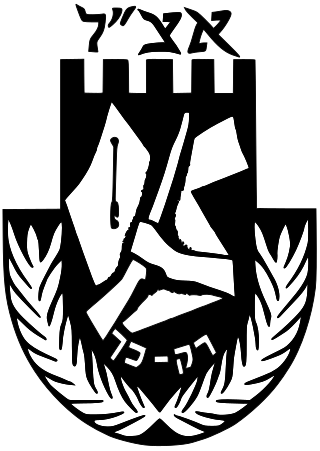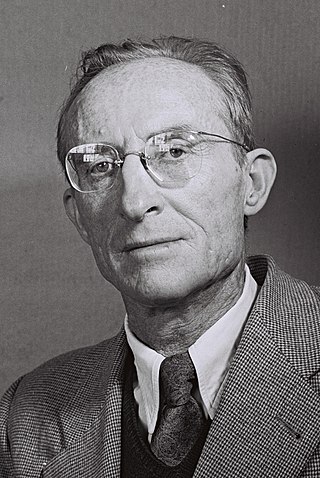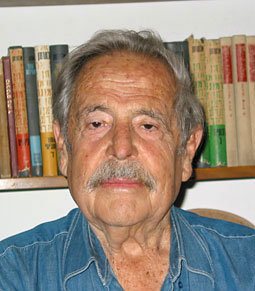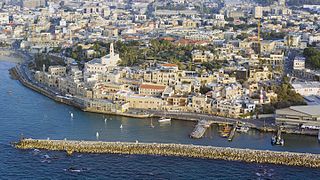Related Research Articles

The Irgun, or Etzel, was a Zionist paramilitary organization that operated in Mandate Palestine and then Israel between 1931 and 1948. It was an offshoot of the older and larger Jewish paramilitary organization Haganah. The Irgun has been viewed as a terrorist organization or organization which carried out terrorist acts.

The 1948 Arab–Israeli War, also known as the First Arab–Israeli War, followed the civil war in Mandatory Palestine as the second and final stage of the 1948 Palestine war. It formally began following the end of the British Mandate for Palestine at midnight on 14 May 1948; the Israeli Declaration of Independence had been issued earlier that day, and a military coalition of Arab states entered the territory of British Palestine in the morning of 15 May.

Davar was a Hebrew-language daily newspaper published in the British Mandate of Palestine and Israel between 1925 and May 1996.

Uri Zvi Greenberg was an acclaimed Israeli poet, journalist and politician who wrote in Yiddish and Hebrew.

Haim Gouri was an Israeli poet, novelist, journalist, and documentary filmmaker. Widely regarded as one of the country's greatest poets, he was awarded the Israel Prize for poetry in 1988, as well as being the recipient of several other prizes of national distinction.

Nathan Alterman was an Israeli poet, playwright, journalist, and translator. Though never holding any elected office, Alterman was highly influential in Socialist Zionist politics, both before and after the establishment of the modern State of Israel in 1948.

Israel Eldad, was an Israeli Revisionist Zionist philosopher and member of the Jewish underground group Lehi in Mandatory Palestine.

Yoav Gelber is a professor of history at the University of Haifa, and was formerly a visiting professor at The University of Texas at Austin.

Dov Sadan was an Israeli literary critic and politician who served as a member of the Knesset for the Alignment between 1965 and 1968.

Events in the year 1925 in the British Mandate of Palestine.

Sami Shalom Chetrit is a Moroccan-born Hebrew poet an inter-disciplinary scholar and teacher, and Israeli social and peace activist.

Jaffa, also called Japho or Joppa in English, is an ancient Levantine port city founded by the Canaanites that is now part of southern Tel Aviv, Israel. Sitting atop a naturally elevated outcrop on the Mediterranean coastline, it was a strategic location that exchanged hands repeatedly in ancient Near East history, and was also contested during the Crusades, when it presided over the County of Jaffa and Ascalon.
The Khazar hypothesis of Ashkenazi ancestry, often called the Khazar myth by its critics, is a largely abandoned historical hypothesis that postulated that Ashkenazi Jews were primarily, or to a large extent, descended from Khazars, a multi-ethnic conglomerate of mostly Turkic peoples who formed a semi-nomadic khanate in and around the northern and central Caucasus and the Pontic–Caspian steppe. The hypothesis also postulated that after collapse of the Khazar empire, the Khazars fled to Eastern Europe and made up a large part of the Jews there. The hypothesis draws on medieval sources such as the Khazar Correspondence, according to which at some point in the 8th–9th centuries, a small number of Khazars were said by Judah Halevi and Abraham ibn Daud to have converted to Rabbinic Judaism. The scope of the conversion within the Khazar Khanate remains uncertain, but the evidence used to tie the subsequent Ashkenazi communities to the Khazars is meager and subject to conflicting interpretations.
The 1928 People's Cup was the first season of Israeli Football Association's nationwide football cup competition. Matches began on 7 April 1928 and the final was played on 26 May 1928.
The 1929 Palestine Cup was the second season of Israeli Football Association's nationwide football cup competition. The joint-winners of the previous competition were Hapoel Tel Aviv and Maccabi Hasmonean Jerusalem.
The 1930 Palestine Cup was the third season of Israeli Football Association's nationwide football cup competition. The defending holders were Maccabi Tel Aviv.
The 1934 Palestine Cup was the sixth season of Israeli Football Association's nationwide football cup competition. The defending holders were Maccabi Tel Aviv.
The 1930–31 season was the fourth season of competitive football in the British Mandate for Palestine under the Eretz Israel Football Association. During the season, the Arab Palestine Sports Federation was established as a rival to the Jewish-controlled EIFA.
The 1943 Palestine Wartime Cup was a special edition of the Palestine Cup, declared to be separate from the main Palestine Cup competition with its own trophy However, the IFA recognize the title as part of the main competition.

Yaron Tsur, an historian of the Jews in the Muslim lands in the modern era, is amongst the founders of the Open University of Israel, a professor in the department of Jewish history at Tel Aviv University and a former chairperson of its graduate school of Jewish studies. He is a pioneer in the field of Digital Humanities in Israel and the founder of the "Historical jewish press" website.
References
- 1 2 Immigration card - Avraham Poliak - File no. STC6, archive of The Jewish Agency for Israel, Jerusalem.
- ↑ Officer's questionnaire form - 1953-05-21, IDF archive.
- ↑ Archive of the École Biblique et Archéologique Française de Jérusalem - 2013-04-13.
- ↑ Davar daily newspaper - "Confirmation Celebration at the Hebrew University" - 1934-12-20.
- ↑ A.N. Polak - Introduction to: "The History of Land Relationships in Egypt, Syria and Israel During the Late Middle Ages and in Modern Times" , dissertation for PhD - Hebrew University, Jerusalem 1940, p. 1. 1940
- ↑ Poliak, A. N. (1934). "Les revoltes populaires en Égypte à l'époque des Mamelouks et leur causes économiques". Revue des études islamiques. 8.
- ↑ Poliak, A. N. (1939). Feudalism in Egypt, Syria, Palestine and the Lebanon, 1250-1900. London: The Royal Asiatic Society Prize Publication Fund. pp. Vol. XVII - 8s. 6d.
- ↑ Heyworth-Dunne, J. (1940). Reviews of Books - Bulletin of the School of Oriental Studies. London: University of London. pp. Vol. 10, No. 2, p.532.
- ↑ "The Khazars' Conversion to Judaism". Zion - Israel History Quarterly, Published by the Israeli Company for History and Ethnography (With the Support of the Bialik Institution). March–April 1941, pp. 106-112, June–July 1941, pp. 160-180.
- ↑ Polak, Dr. Ab. N. (1943). Khazaria - Toldot Mamlacha Yehudit BeEropa. Tel Aviv, Israel: Bialik Institute by Masada.
- ↑ Davar daily newspaper - "Ceremony of the Bialik Award for 1943" - 1944-01-06.
- ↑ Al HaMishmar daily newspaper - "A. Kavak and Dr. Polak are the Laureates of the Bialik Award for 1943" - 1944-01-06.
- 1 2 Program for the ceremony of the Bialik Award - Bialik House Museum, Tel Aviv 1943.
- ↑ IDF archive - personal file of Abraham Polak.
- ↑ Davar daily newspaper - "The Kugel Award Was Given to Y. Cohen and Ab. N. Polak" - 1955-05-20.
- ↑ Al HaMishmar daily newspaper - "Awards for Literature and Science Are Given by the Municipality of Holon" - 1955-05-22.
- ↑ Davar daily newspaper - "The University Institute for Israeli Culture and Humanities in Tel Aviv" - 1955-11-02.
- ↑ Davar daily newspaper - "The Department of African Studies at the University" - 1961-08-07.
- ↑ Al HaMishmar daily newspaper - "The Russian Academy Commissioned Research Work from Prof. Polak" - 1944-01-06.
- ↑ Maariv daily newspaper - "A Scholar from Tel Aviv Gave a Lecture in Calcutta" - 1964-01-23.
- ↑ Maariv daily newspaper - "Professor Polak Has Died" - 1970-03-09.
- ↑ HaBoker daily newspaper - 1943-04-19.
- ↑ HaTzofe daily newspaper - "Khazaria" - 1943-05-14.
- ↑ HaMashkif daily newspaper - "Khazaria" - 1943-04-09.
- ↑ The Palestine Post daily newspaper - "Books in the News" - 1943-05-13.
- ↑ Baron, Shalom (1960). Historia Chevratit ve Datit shel Am Israel [A Social and Religious History of the Jews]. Ramat Gan: Masada. pp. 174–175, Volume IV.
- ↑ Dinur, Ben-Zion (1961). Yisrael BaGola [Israel in the Diaspora]. Tel Aviv: Dvir. pp. 3–5, Volume I (2).
- ↑ Eshkoli, Aharon Zeev (1944). "Scharcheret shel Historia [Carousel of History]". Moznayim. 6: 382.
- ↑ Baron, S.W. (1958). A Social and Religious History of the Jews. Vol. 1 (2nd ed.). New York, NY: Columbia University Press. pp. 8 different pages. ISBN 978-0231088381.
- ↑ Brook, Kevin Alan (2006). The Jews of Khazaria (2nd ed.). Plymouth, UK: Rowman & Littlefield. pp. 156, 226. ISBN 9780742549814.
- ↑ Dunlop, D M (1968). History of the Jewish Khazars (New ed.). Princeton, NJ: Schocken Books. pp. 31 different pages. ISBN 9780805201673.
- ↑ Koestler, Arthur (1976). The Thirteenth Tribe. The Khazar Empire and Its Heritage. New York, NY: Random House. pp. 21 different pages. ISBN 0394402847.
- ↑ Needham, Joseph (1959). Science and Civilisation in China. Vol. III. Cambridge, UK: Cambridge University Press. p. 682. ISBN 0521058015.
- ↑ Marturano, A.C. (2004). Mescekh: il paese degli ebrei dimenticati[Mescekh: the Land of the Forgotten Jews] (in Italian). Milan, Italy. p. 185. ISBN 8888730060.
{{cite book}}: CS1 maint: location missing publisher (link) - ↑ Nahon, G. (2019). Dictionnaire du Judaïsme[Dictionary of Judaism] (in French). Paris, France: Encyclopædia Universalis. ISBN 9782852291423.
- ↑ Pinar, Ozgun (2013). Hazarlar Kayip Kavim[Khazars Lost Tribe] (in Turkish). Istanbul, Turkey: Cinius Yayinlar. pp. 41, 50. ISBN 9786051278100.
- ↑ Roth, Andreas (2006). Chasaren. Das vergessene Großreich der Juden[Khazars: The Forgotten Great Empire of the Jews] (in German). Neu Isenburg, Germany: Melzer. p. 148. ISBN 9783937389714.
- ↑ Polak, Abraham Nahum (2015). Chazaria Dzieje królestwa źydowskiego w Europie, z hebrajskiego przełoźył oraz przedmową poprzedził Krzysztof Dawid Majus [Khazaria: History of a Jewish Kingdom in Europe, Kshishtof David Majus translated from Hebrew into Polish and wrote the introduction]. Przemyśl, Poland: Południowo-Wschodni Instytut Naukowy w Przemyślu [The South-Eastern Institute for Research in Przemyśl]. ISBN 978-83-60374-20-7.